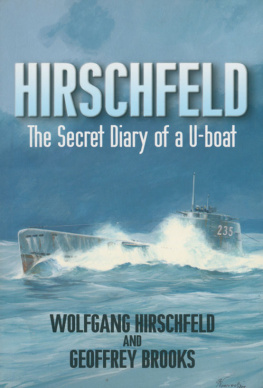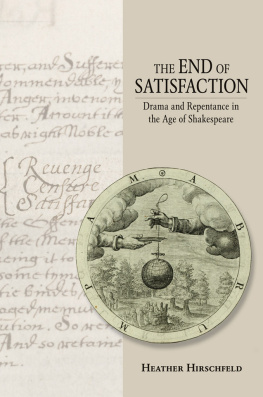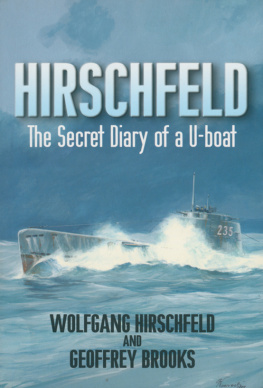Wolfgang Hirschfeld - Hirschfeld:The Secret Diary of a U-Boat
Here you can read online Wolfgang Hirschfeld - Hirschfeld:The Secret Diary of a U-Boat full text of the book (entire story) in english for free. Download pdf and epub, get meaning, cover and reviews about this ebook. year: 2011, publisher: frontline books, genre: Non-fiction / History. Description of the work, (preface) as well as reviews are available. Best literature library LitArk.com created for fans of good reading and offers a wide selection of genres:
Romance novel
Science fiction
Adventure
Detective
Science
History
Home and family
Prose
Art
Politics
Computer
Non-fiction
Religion
Business
Children
Humor
Choose a favorite category and find really read worthwhile books. Enjoy immersion in the world of imagination, feel the emotions of the characters or learn something new for yourself, make an fascinating discovery.
- Book:Hirschfeld:The Secret Diary of a U-Boat
- Author:
- Publisher:frontline books
- Genre:
- Year:2011
- Rating:4 / 5
- Favourites:Add to favourites
- Your mark:
- 80
- 1
- 2
- 3
- 4
- 5
Hirschfeld:The Secret Diary of a U-Boat: summary, description and annotation
We offer to read an annotation, description, summary or preface (depends on what the author of the book "Hirschfeld:The Secret Diary of a U-Boat" wrote himself). If you haven't found the necessary information about the book — write in the comments, we will try to find it.
Hirschfeld:The Secret Diary of a U-Boat — read online for free the complete book (whole text) full work
Below is the text of the book, divided by pages. System saving the place of the last page read, allows you to conveniently read the book "Hirschfeld:The Secret Diary of a U-Boat" online for free, without having to search again every time where you left off. Put a bookmark, and you can go to the page where you finished reading at any time.
Font size:
Interval:
Bookmark:
HIRSCHFELD
The Secret Diary of a U-boat
WOLFGANG HIRSCHFELD
and
GEOFFREY BROOKS

First published in Great Britain by Leo Cooper in 1996
Paperback edition published in 1997 by
Orion Books Ltd
Orion House, 5 Upper St Martins Lane
London WC2H 9EA
This edition published in 2011 by Frontline Books,

an imprint of
Pen & Sword Books Ltd.,
47 Church Street, Barnsley, S. Yorkshire, S70 2AS.
Visit us at www.frontline-books.com,
email info@frontline-books.com
or write to us at the above address.
Copyright Geoffrey Brooks, 1996
The right of Geoffrey Brooks to be identified as the author of this
work has been asserted by him in accordance with the Copyrights,
Designs and Patents Act 1988.
ISBN 978-1-84832-622-4
No part of this publication may be reproduced, stored in or
introduced into a retrieval system, or transmitted, in any form, or
by any means (electronic, mechanical, photocopying, recording or
otherwise) without the prior written permission of the publisher.
Any person who does any unauthorized act in relation to this
publication may be liable to criminal prosecution and civil claims
for damages.
CIP data records for this title are available from the British Library.
Printed and Bound in Great Britain by CPI Group (UK) Ltd, Croydon CRo 4YY
For my son Louis Brooks and daughter Angie Brooks
CONTENTS
The author wishes to acknowledge the assistance of the library of the Institute of Marine Engineers, Mark Lane, EC3: the German Historical Institute, Bloomsbury Square, WC2, and the Science Museum Library, South Kensington, and extends his thanks to Professor Dr Jrgen Rohwer, the naval historian, who supplied much useful information with regard to the question of the uranium oxide aboard U234: to Jak Mallmann-Showell, the U-boat historian and author, who checked the manuscript for error and pointed out a number of avenues the author had carelessly left unexplored. Finally to Brigadier Bryan Watkins and to my ex-MN friend Philip Oastler a special note of gratitude for invaluable comments, suggestions and encouragement.
Geoffrey Brooks
London 1996
This book, based on a secret diary of a U-boat radio operator, ranks as one of the most outstanding documents of the Second World War. It is unique inasmuch as it is probably the only U-boat diary kept by an NCO as the events unfolded. The keeping of private records was so strictly forbidden that discovery would have resulted in court-martial.
Wolfgang Hirschfeld witnessed almost the whole period of the Battle of the Atlantic and his position enabled him to be better informed than many officers. What is more, he served under three unusual commanders. The first, Fischer, was dismissed unjustly for the incompetence of his chief engineer. The second, Bleichrodt, one of the famous aces, was probably the only German naval officer to have resigned in mid-operations on the high seas and to have broadcast his intention for all to hear. The third, Fehler, joined the U-boat Arm after having served as Demolition and Explosives Officer aboard the legendary raider Atlantis.
Hirschfelds final voyage is of special interest because many aspects of it are still shrouded in mystery. The submarine, U-234, surrendered on its way to Japan. When the Americans unloaded it, they found amongst its cargo of war material an Me 262 jet and radioactive substances.
Wolfgang Hirschfeld was a natural writer of great ability. Not only does he bring the past alive by illustrating hard facts with fascinating anecdotes of shipboard life, but he slots the events he is describing into the overall picture of the war. The English version is just as compelling as the original German.
SECOND EDITION
Wolfgang Hirschfeld died on 24 April 2005, a few weeks short of his 89th birthday. His death releases me from a pledge I made to him during our collaboration on the first edition of this book to remain silent on certain matters until after his passing.
It was in 1985 that I first contacted him with an offer to work jointly to produce the English-language version of his published diaries Feindfahrten (Paul Neff Verlag, Vienna, 1982). Following his agreement I was supplied with additional unpublished material, about one hundred typed pages in all, which he encouraged me to include in the manuscript as I saw fit. During the compilation of the translation and arrangement of material it was necessary for me to consult Hirschfeld quite frequently to clarify matters arising. Whatever I asked about U-109 was always answered by return, but almost anything sensitive I needed to know about U-234 had to be referred by Hirschfeld to an authority before I would receive an answer, not always satisfactory. I became aware by this means that there still exists in modern Germany a rigid military discipline enforced against all former members of the German armed forces from the Hitler period, its main aim being to guard certain secrets. Accordingly I understood Hirschfelds real fears when he confided that he had to be cautious regarding what he said about the submarine U-234.
The mystery of U-234 can be summarized as follows. After being loaded with cargo at Kiel, U-234 left for Tokyo via Norway on 26 March 1945, and surrendered at sea to US naval forces on 17 May 1945. The boat, a huge Type XB minelayer as long as a football pitch and converted for cargo purposes, was unloaded at Portsmouth, New Hampshire. Exactly how much cargo was aboard is not known because only a partial unloading manifest has ever been declassified. This is clear from the insistence of the commander, Heinrich Fehler, and Wolfgang Hirschfeld, that there was an Me 262 jet aircraft in its component parts aboard U-234, yet this item does not feature on the US unloading manifest. Neither do the 39 barrels of heavy water and 90 cases of U-powder referred to in two cables dated May 1945 appear in the manifest.
The U-234 cargo appears to have consisted mainly of strategic war materials estimated in weight at around 250 tons. The item of cargo attracting most attention was 10 cases uranium oxide 560 kgs. All efforts to determine officially from the US authorities the nature of this uranium oxide have been unsuccessful to date. Despite numerous requests to them under the Freedom of Information Act, the reply has always been that matters relating to nuclear affairs are still subject to official secrecy. Since US law does not supply a blanket to suppress all information about nuclear affairs, it is likely that the material is secret in the interests of national defense or foreign policy. The fact that it remains exempt from declassification after 65 years indicates its extraordinary nature.
I asked Hirschfeld about these ten cases on several occasions before the first edition was published in 1996. He said each time that honestly he had no idea what they contained and it had never been something which really interested him.
The ten cases of uranium oxide had been stowed in one of six steel loading containers each resembling an enormous cigar tube. Each tube was designed to fit into each of the six vertical mineshafts grouped down the centreline of the U-234 foredeck. In a letter in 1995, Hirschfeld revealed to me that the US scientists unloading U-234 discovered by means of Geiger counters that all the steel tubes were contaminated with radiation. So extensive was this contamination with radiation that it was not possible to determine in which of the six tubes the uranium oxide had been stowed.
Next pageFont size:
Interval:
Bookmark:
Similar books «Hirschfeld:The Secret Diary of a U-Boat»
Look at similar books to Hirschfeld:The Secret Diary of a U-Boat. We have selected literature similar in name and meaning in the hope of providing readers with more options to find new, interesting, not yet read works.
Discussion, reviews of the book Hirschfeld:The Secret Diary of a U-Boat and just readers' own opinions. Leave your comments, write what you think about the work, its meaning or the main characters. Specify what exactly you liked and what you didn't like, and why you think so.








